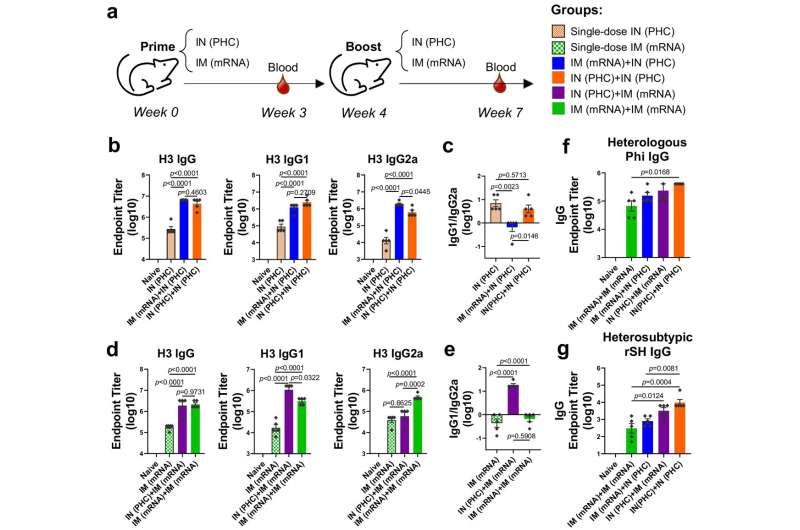This article has been reviewed according to Science X's editorial process and policies. Editors have highlighted the following attributes while ensuring the content's credibility:
fact-checked
peer-reviewed publication
trusted source
proofread
Study: Nanoparticle vaccines enhance cross-protection against influenza viruses

To offer cross-protection against diverse influenza virus variants, nanoparticle vaccines can produce pivotal cellular and mucosal immune responses that enhance vaccine efficacy and broaden protection, according to a study by researchers in the Institute for Biomedical Sciences at Georgia State University.
The study, published in the journal Nature Communications, offers valuable insights into tailoring immunization strategies to optimize influenza vaccine effectiveness. To alleviate the significant public health burden of influenza epidemics and occasional pandemics, it's essential to enhance influenza vaccine cross-protection, according to the authors.
While the Centers for Disease Control and Prevention (CDC) recommends annual influenza vaccination, current seasonal influenza vaccines typically provide strain-specific and short-lived immunity. Seasonal influenza vaccines offer limited cross-protection against antigenically diverse virus variants and provide no defense against sporadic influenza pandemics, the authors explained.
"Developing effective influenza vaccines or vaccination strategies that can confer cross-protection against variant influenza viruses is a high priority to mitigate the public health consequences of influenza," said Dr. Chunhong Dong, first author of the study and a postdoctoral fellow in the Institute for Biomedical Sciences at Georgia State.
In the study, the researchers investigated the effects of immunization strategies on the generation of cross-protective immune responses in female mice using mRNA lipid nanoparticle (LNP) and protein-based polyethyleneimine-HA/CpG (PHC) nanoparticle vaccines targeting influenza hemagglutinin. The mice were immunized with either intramuscular mRNA LNP or intranasal PHC vaccines in a typical prime-plus-boost regimen. A variety of sequential immunization strategies were included in this study for parallel comparison.
"We demonstrated that cellular and mucosal immune responses are pivotal correlates of cross-protection against influenza," said Dr. Baozhong Wang, senior author of the study and a Distinguished University Professor in the Institute for Biomedical Sciences at Georgia State.
"Notably, intranasal PHC immunization outperforms its intramuscular counterpart in inducing mucosal immunity and conferring cross-protection. Sequential mRNA LNP prime and intranasal PHC boost demonstrated optimal cross-protection against antigenically drifted and shifted influenza strains."
The study highlights the importance of immunization orders and indicates that in a sequential immunization, an mRNA vaccine priming plays an important role in steering the Th1/Th2 immune responses. Also, the intranasal PHC boost is crucial to the induction of mucosal immunity, Wang said.
Additional authors of the study include Wandi Zhu, Lai Wei, Joo Kyung Kim, Yao Ma and Sang-Moo Kang of the Institute for Biomedical Sciences at Georgia State.
More information: Chunhong Dong et al, Enhancing cross-protection against influenza by heterologous sequential immunization with mRNA LNP and protein nanoparticle vaccines, Nature Communications (2024). DOI: 10.1038/s41467-024-50087-5
Journal information: Nature Communications
Provided by Georgia State University





















